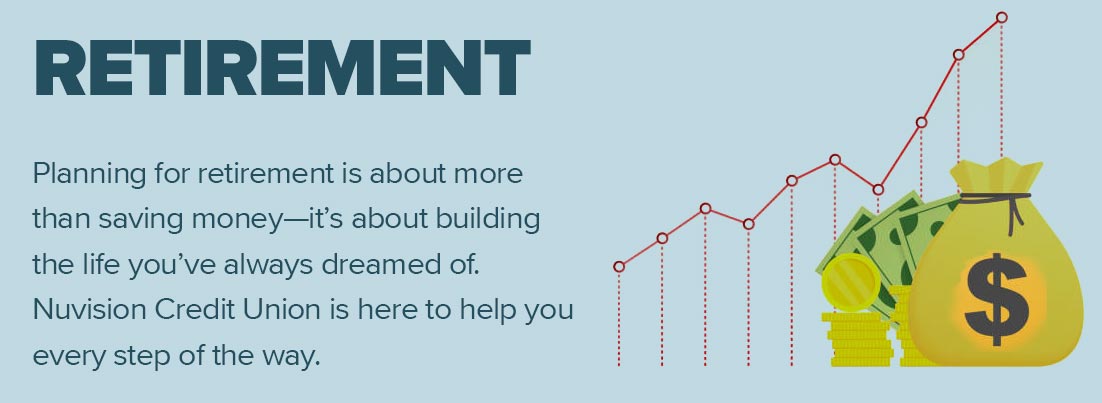

Retirement Planning Made Simple—Start Today for a Better Tomorrow
Planning for retirement can feel overwhelming, especially when you're not sure where to begin. But the truth is, it's never too late—or too early—to start building a secure future. Whether you're saving for a comfortable retirement, unexpected expenses, or just peace of mind, we're here to guide you.
Retirement Matters: Why Financial Knowledge is Key
Understanding your finances is essential for creating a retirement plan that works for you. Our resources cover everything from saving strategies to retirement account options, giving you the confidence to plan for a secure and fulfilling future.
The complete guide to planning for retirement
Practical tips and strategies for retirement planning in Nuvision's comprehensive guide. Learn how to calculate savings goals, choose the right accounts, and make the most of your retirement years.
How to Start Saving for Retirement
For those who are investing or planning for their retirement, the past couple of years have been challenging, to say the least. Here are some tips to plan for retirement in any economy.
The Power of Compound Interest: Why Starting Early Matters
Have you ever wondered why financial experts always emphasize saving early? It’s not just about setting money aside—it’s about using time to your advantage. When it comes to securing your future, especially for retirement, compound interest can be your best friend.
See How Your 401(k) Can Grow Over Time
Curious about how your 401(k) savings can build over the years? Our 401(k) calculator makes it easy to visualize your financial future. See how regular contributions and employer matches can add up, turning small steps into significant progress. Whether you're planning for retire
A 401(k) can be one of your best tools for creating a secure retirement. It provides you with two important advantages. First, all contributions and earnings to your 401(k) are tax-deferred. You only pay taxes on contributions and earnings when the money is withdrawn. Second, many employers provide matching contributions to your 401(k) account. The combined result is a retirement savings plan you cannot afford to pass up.
Information and interactive calculators are made available to you as self-help tools for your independent use and are not intended to provide investment advice. We cannot and do not guarantee their applicability or accuracy in regards to your individual circumstances. All examples are hypothetical and are for illustrative purposes. We encourage you to seek personalized advice from qualified professionals regarding all personal finance issues.
VIDEO RESOURCES
RETIREMENT FAQS
The earlier, the better. Starting in your 20s or 30s allows you to take full advantage of compound interest. Even small contributions made early can grow significantly over time.
A common rule of thumb is to aim for 70-80% of your pre-retirement income annually, but this can vary widely based on your individual circumstances. To estimate how much you’ll need, consider factors such as:
- Lifestyle Goals: Are you planning a quiet retirement or do you envision traveling, pursuing hobbies, or living in a high-cost area? Larger plans require a larger nest egg.
- Retirement Age: The earlier you retire, the more years of income you’ll need to fund. For example, retiring at 65 could mean 20-30 years of expenses, while retiring at 70 may reduce that number.
- Healthcare Costs: Medical expenses typically increase with age and are often underestimated. Include premiums for Medicare, supplemental insurance, and out-of-pocket costs.
- Other Income Sources: Factor in Social Security, pensions, or part-time work. These can offset some of the savings you’ll need to draw from your retirement accounts.
- Inflation: Your cost of living will rise over time, so it’s crucial to account for inflation when estimating your needs.
To calculate your specific savings goal, start by estimating your annual retirement expenses. Multiply this number by the years you expect to spend in retirement. For example, if you need $70,000 annually and expect to live 25 years in retirement, you’ll need $1.75 million saved.
A 401(k) is employer-sponsored and often includes contribution matches, while IRAs are individual accounts with tax advantages. Both are excellent options, and many people use both to diversify their retirement savings.
Yes, but early withdrawals often come with penalties and tax implications. Certain accounts, like Roth IRAs, offer more flexibility, but it’s generally best to avoid tapping into retirement funds before age 59½.
Nuvision offers a variety of savings options tailored to retirement, including IRAs and Certificates of Deposit with competitive rates. Our team is here to provide guidance and help you choose the right tools to secure your future.






